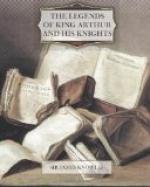“I am no knight,” said Sir Gawain; “I have been brought up many years in the wardrobe of the noble prince King Arthur, to mind his armour and array.”
“Ah,” said Prianius, “if his varlets be so keen and fierce, his knights must be passing good! Now, for the love of heaven, whether thou be knight or knave, tell me thy name.”
“By heaven!” said Gawain, “now will I tell thee the truth. My name is Sir Gawain, and I am a knight of the Round Table.”
“Now am I better pleased,” said Prianius, “than if thou hadst given me all the province of Paris the rich. I had rather have been torn by wild horses than that any varlet should have won such victory over me as thou hast done. But now, Sir knight, I warn thee that close by is the Duke of Lorraine, with sixty thousand good men of war; and we had both best flee at once, for he will find us else, and we be sorely wounded and never likely to recover. And let my page be careful that he blow no horn, for hard by are a hundred knights, my servants; and if they seize thee, no ransom of gold or silver would acquit thee.”
Then Sir Gawain rode over a river to save himself, and Sir Prianius after him, and so they both fled till they came to his companions who were in the meadow, where they spent the night. When Sir Whishard saw Sir Gawain so hurt, he ran to him weeping, and asked him who it was had wounded him; and Sir Gawain told him how he had fought with that man—pointing to Prianius—who had salves to heal them both. “But I can tell ye other tidings,” said he—“that soon we must encounter many enemies, for a great army is close to us in our front.”
Then Prianius and Sir Gawain alighted and let their horses graze while they unarmed, and when they took their armour and their clothing off, the hot blood ran down freshly from their wounds till it was piteous to see. But Prianius took from his page a vial filled from the four rivers that flow out of Paradise, and anointed both their wounds with a certain balm, and washed them with that water, and within an hour afterwards they were both as sound and whole as ever they had been. Then, at the sound of a trumpet, all the knights were assembled to council; and after much talking, Prianius said, “Cease your words, for I warn you in yonder wood ye shall find knights out of number, who will put out cattle for a decoy to lead you on; and ye are not seven hundred!”
“Nevertheless,” said Sir Gawain, “let us at once encounter them, and see what they can do; and may the best have the victory.”
Then they saw suddenly an earl named Sir Ethelwold, and the Duke of Duchmen come leaping out of ambush of the woods in front, with many a thousand after them, and all rode straight down to the battle. And Sir Gawain, full of ardour and courage, comforted his knights, saying, “They all are ours.” Then the seven hundred knights, in one close company, set spurs to their horses and began to gallop, and fiercely met their enemies. And then were men and horses slain and overthrown on every side, and in and out amidst them all, the knights of the Round Table pressed and thrust, and smote down to the earth all who withstood them, till at length the whole of them turned back and fled.




